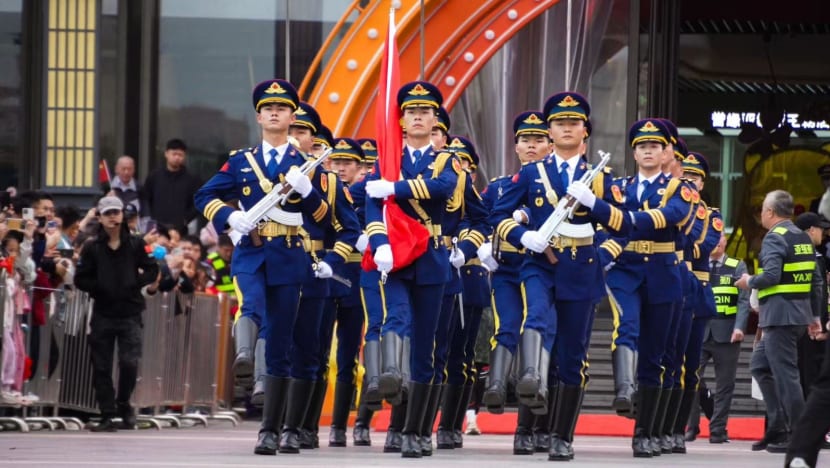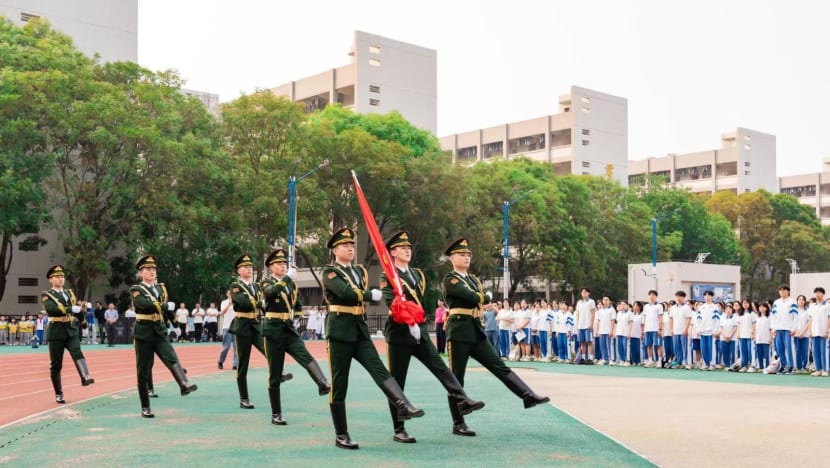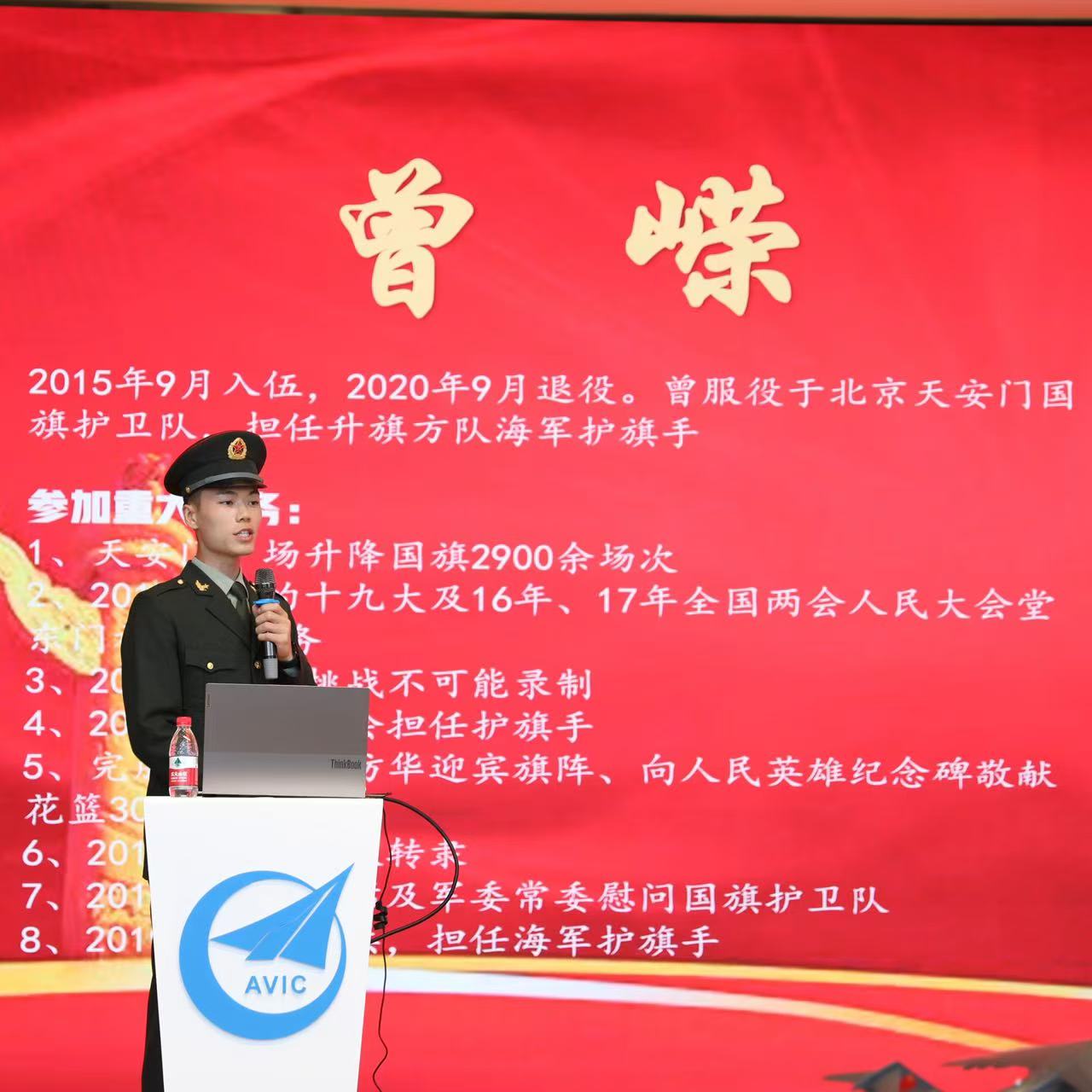Young patriotic ex-soldiers bring Tiananmen flag ceremony to schools, social media
Waking up at 2.50am, marching 25,000 steps a day — former PLA soldiers-turned-influencers captivate netizens in China with their stories.

A photo of Chixin National Flag Guard, a squad made up of former soldiers of the People’s Liberation Army’s (PLA) honour guard. (Photo: Zeng Rong)

This audio is generated by an AI tool.
SINGAPORE: Wearing white gloves and their signature olive green uniforms, the eight men march with rhythmic precision across the parade square of a middle school, bearing China’s flag high, as an assembly of students looks on.
Their years of training and discipline are unmistakable — this is no ordinary marching group.
Each at least 1.85m tall, they are members of the Chixin National Flag Guard — former soldiers of the People’s Liberation Army’s (PLA) honour guard — who have undergone years of rigorous daily training in and around Beijing’s Tiananmen Square.
The group formed in 2023 and was started by Zeng Rong, a 27-year-old former PLA soldier from Jiangxi province, together with a squad leader he once served alongside in Beijing.
Their goal is to bring the Tiananmen Square flag-raising ceremony — popular among both locals and tourists — to every corner of China, including schools and companies, to instil national pride.
Taking their influence even further, they have an active presence on Douyin, China’s short-form video platform, where they engage with young Chinese social media users.
“We can really make an impact on a young person’s values and outlook on life,” Zeng told CNA in a phone interview.
Zeng and his team members are part of a new wave of influencers in China — young, patriotic former national flag bearers who have taken to social media to promote their brand of ‘patriotic education’.
“We are showing them what it's like to be patriotic and to love our country,” Zeng said.

Just as throngs of tourists flock to Buckingham Palace in London to witness the Changing of the Guard, Zeng hopes to ignite patriotism and excitement through their flag ceremonies.
In a one-minute video shared on Douyin that garnered hundreds of likes and comments, the group carried out a PLA-style flag-raising ceremony at Heung To Middle School in Hong Kong in 2023.
“They truly look like heroes,” commented a user named Jindou. “You don't have to squeeze with the crowds at Tiananmen Square to see the PLA honour guard, they're right here.”
“Our hearts swell with pride and emotion at the sight of the vibrant five-star red flag,” wrote a user with the handle ermao.
FORMER SOLDIERS TURNED INFLUENCERS
To date, the Chixin National Flag Guard has participated in hundreds of flag-raising and marching ceremonies for corporations including a Chinese airline company, as well as schools and other educational institutes throughout the country.
Members also attend public forums and sharing sessions, where they take questions about their work and former military lives, Zeng said.
On Douyin, the group has more than 60,000 followers and a high engagement rate.
Popular posts include flag-raising ceremonies, sharing sessions at schools, and even lighthearted bloopers from their training.
Zeng himself has a massive presence on Douyin, with more than 333,000 followers on his personal account. He is often recognised in public — even on flights — but that doesn’t bother him.
“I’m happy when people recognise me. It means what I’m doing is meaningful and that more people are (becoming) aware of the group and I am proud of this,” Zeng said.
At the same time, Zeng and his team are cautious about excessive commercialisation. The group turned down a 200,000 yuan (US$27,600) investment from a private company, according to an earlier article by the Ministry of Veterans Affairs.
“To be honest, 200,000 yuan is a large sum to us,” Zeng said.

“But we decided we cannot be too commercialised, and stuck to our original goal.”
“We don’t force ourselves to film (for the sake of content),” he added. “By sharing our activities on social media, we want to let more people know what we’re doing.”
Other former national flag bearers have also taken to social media to share their personal accounts and experiences, which include 2am wake-up calls and gruelling training drills, such as standing, marching and holding guns for extended periods in harsh weather conditions.
Zhang Zixuan, 31, is a former Tiananmen Square flag bearer who runs a popular Douyin account with over 883,000 followers.
While Zhang also shares content like cooking videos and updates about daily life working on his family’s farm, videos about his military past prove most popular with his online following.
In one video, Zhang spoke about his military career, during which he participated in more than 7,700 flag-raising ceremonies. Curious netizens left comments asking why he had left the military.
“What a pity” and “Are you sure this will not affect your career progression?” were some of the comments he highlighted. However, Zhang responded that there was “nothing to feel pity about”.
“I was raised by farming folk, and I’m doing something that I’m passionate about,” Zhang said.
“I’m just an ordinary veteran, I have my own dreams and places I want to go to.”
Although he is officially retired from the military, the flag bearer-turned-influencer continues to promote ‘patriotic education’ through some of his content. In one video, which garnered nearly 25,000 engagements, he visited a museum and discussed China’s intervention in the Korean War in 1950.
WHAT IT TAKES TO BE A FLAG BEARER
Growing up in Jiangxi, Zeng never considered enlisting in the army until he watched a popular TV variety show featuring celebrities in military service. Inspired, he enlisted in 2015 at the age of 17 and went on to become a flag bearer at Tiananmen Square, a prestigious position under the PLA’s honour guard.
Throughout his five-year military stint, Zeng completed nearly 3,000 flag-raising duties. He also underwent 10 months of rehearsals and training to march in the 2019 China National Day Parade.
“I felt so much pride,” Zeng said. “I knew I was not just representing myself … I'm proud to be part of the PLA, to be able to represent the country and to have been part of that parade.”
For those wishing to follow in his footsteps and join the honour guard, Zeng has some advice. The “process is very selective” and there are extremely strict physical requirements that must be met.

Women must meet a minimum height requirement of 1.73m, while male recruits have to be taller than 1.83m. Zeng himself stands at 1.85m.
Members of the honour guard can train up to eight hours a day and are known to march for great distances, an average of 25,000 steps a day, Zeng said. They are also required to stand for long periods of time while holding their rifles and maintaining their gaze.
Since the timing of the flag ceremony aligns with sunrise and sunset, it can mean waking up as early as 2.50am in summer, or at a more manageable 5am in winter.
Beijing’s punishing winter weather can be a particular challenge and honour guard hopefuls must be prepared to endure freezing temperatures outdoors, Zeng said.
He recalled how, on one occasion, heavy rain had driven crowds away from Tiananmen Square, leaving him feeling slightly demoralised. But he persevered and continued marching.
“The streets pooled with rainwater and yet we pressed on … because no matter how heavy the rain got, the flag-raising ceremony must still go on,” he said.
When they arrived at the square, the crowds began to return, choosing to stand in the rain with them - some even taking off their hats and raincoats.
“I don’t know if it was tears or rainwater in my eyes.”
Successful enlistment, whether it’s becoming a flag bearer or not, is something everyone should be proud of, he added.
“For every soldier donning their uniform the first time, it's your moment to be proud.”















